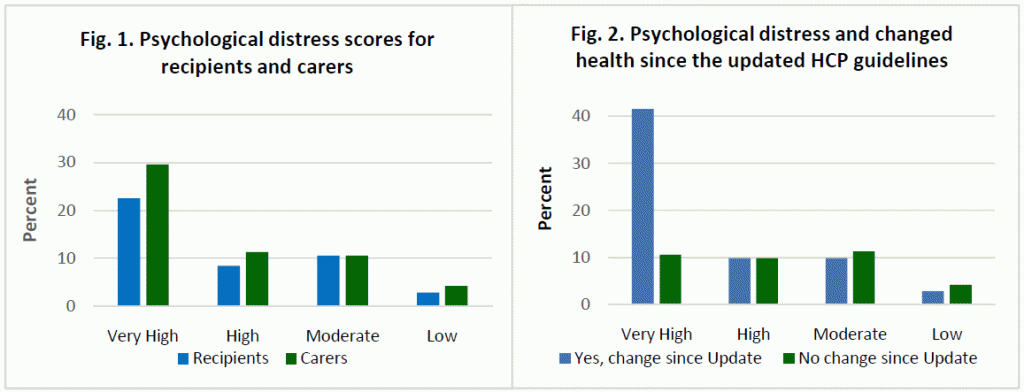|
Family Law Research Journal http://www.familylawexpress.com.au/family-law-research-journal/discrimination/summary-of-results-of-a-survey-on-the-mental-health-of-home-care-package/194/ Export date: Tue Jan 27 10:05:29 2026 / +0000 GMT |
||||||||
Summary of Results of a Survey on the Mental Health of Home Care Package Conclusions: The impetus for this online survey was threefold and came from increased reports of significant levels of distress on social media and aged care forums, following:
A majority of HCP recipients and carers surveyed (n=142) were significantly distressed by these policy changes. This level of distress persists today. Alarming and severe levels of distress among HCP recipients and carers should be treated as a warning sign for government, medical and health professionals to act and address the emotional toll of these changes on older Australians. 53% of recipients and carers reported “Very High” levels of psychological distress on the K10. “Very High” levels of distress on the K10 should flag the need for further assessment and the presence of suicidal ideation. (Rainbow et al., 2023). Factors such as burdensomeness, financial wellbeing and belonging, compound this “Very High” risk. Carers needs are often overlooked. Given that over 80% of recipients reported the presence of features of clinical depression on the K10,the significant personal and emotional cost to carers is reflected in 80% reporting features of clinical depression. 82% of recipients and carers rated their quality of life as “the worst possible outcome”, with no recipients and 4% of carers rating their quality of life as “the best possible outcome”. These results are alarming for older Australians and their carers living at home and receiving HCP funding. Much of this psychological distress and poor quality of life is a consequence of government policy that has introduced harsh funding guidelines, strict and discriminatory surveillance by the Safety Commissioner and a perceived loss of autonomy and control in the lives of older Australians. Given that the aim of Support at Home funding is to keep older people at home longer, rather than enter a residential aged care facility, the results of this survey shows that in terms of very high psychological distress and poor quality of life, the government is undermining its stated aim. Most HCP recipients and carers are aware of the need for financial compliance, accountability and fiscal responsibility when receiving taxpayer-generated funding. The majority of older people receiving HCPs want to stay at home and they generally behave with restraint and good sense in regard to the spending of those funds. However, a marketized and profit-driven aged care sector has been handed a policy regime where providers are declining requests for services more often and inconsistently, and thus retaining more funds to invest for profits. Together with a Safety Commissioner who applies a strict, ageist and mandatory one-size-fits-all approach to regulation, increasingly makes it more difficult each day for older people to stay at home and not enter residential aged care. Examples of reports on social media and forums of the impact of these changes included:
Recommendations: Encourage more not-for-profit organisations to become involved in the aged care sector. These organisations, such as cooperatives, generally have a values-based, humanitarian approach to aged care rather than seeing older people as commodities from which to drive profits. As well, local government has relinquished its role in aged care, yet maintains its organisational structures to service regional, rural and remote areas and should be considered as an option for those residents. If the government has a duty-of care towards all of its citizens, and has assumed that duty for older Australians, we believe that it needs to act now to remedy the distressing set of circumstances that has created this alarming level of distress. We recommend that the government urgently:
As the saying goes, the true measure of a society is how it treats its most vulnerable. The important question for government is: will it measure up to this challenge while ensuring self-determination and autonomy for older Australians receiving a HCP and their carers?Regardless of the answer, the “Very High” levels of reported distress and poor quality of life in this survey, indicates that the clock is ticking, and a proactive approach is needed urgently. Brian Corless, Robert Savellis. March 2024. Download the full report as PDF |
||||||||
| Excerpt: Alarming and severe levels of distress among Home Care package recipients and carers should be treated as a warning sign for government, medical and health professionals to act and address the emotional toll of these changes on older Australians. | ||||||||
|
Post date: 2024-05-04 02:24:11 Post date GMT: 2024-05-04 02:24:11 Post modified date: 2024-05-04 03:08:20 Post modified date GMT: 2024-05-04 03:08:20 |
||||||||
|
Export date: Tue Jan 27 10:05:29 2026 / +0000 GMT This page was exported from Family Law Research Journal [ http://www.familylawexpress.com.au/family-law-research-journal ] Export of Post and Page has been powered by [ Universal Post Manager ] plugin from www.ProfProjects.com |